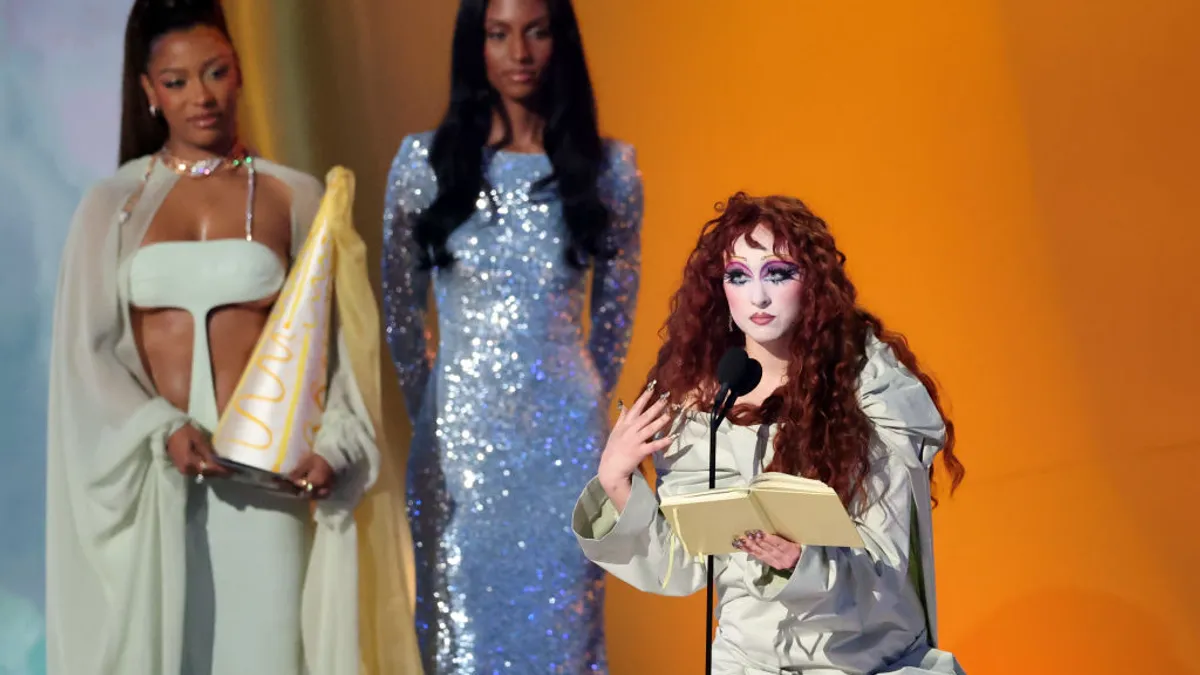NOW PLAYING is HR Dive Reporter Caroline Colvin’s column at the intersection of HR and entertainment.
Standout performances, Beyoncé’s victories: These were the main buzzworthy aspects of the 2025 Grammy Awards. But another noteworthy thread ran through the fabric of Sunday’s award show. Key players, particularly in their awards speeches, gave their two cents on some of the hottest topics in the labor space.
Here are three key moments in the night that can have reverb effects in the world of HR.
Lady Gaga nods to Trump’s anti-trans orders
One of many executive orders put forth by President Donald Trump denied the validity of transgender identity and doubled down on the “binary nature of sex.” Apart from setting the ideological tone for the Republican party, this order sought to ban trans workers from single-sex spaces, such as workplace bathrooms.
After performing alongside Bruno Mars earlier in the night, Lady Gaga and her collaborator returned to accept “Best Pop Duo/Group Performance” for their apocalyptic love song “Die with a Smile.” Mars gave his thanks and Gaga followed.
“Trans people are not invisible,” she stated, to widespread applause, including that of Billie Eilish, Beyoncé and Charli XCX. “Trans people deserve love. The queer community deserves to be lifted up.”
In 2020, the Supreme Court of the United States ruled in Bostock v. Clayton County, Georgia that Title VII of the Civil Rights Act prohibits employment discrimination based on sexual orientation and gender identity. In his executive order, Trump specifically called out this case ruling as detrimental to women.
Now, as the U.S. Equal Employment Opportunity Commission grinds to a halt in processing cases of sexuality- and gender-based discrimination, HR has an opportunity to step up to the plate by showing up for queer workers.
Chappell Roan talks mental health benefits
Dressed ever whimsically, Chappell Roan brought a notebook up on stage to nail what she wanted to say for her “Best New Artist” acceptance speech.
She thanked friends, family, fans and co-workers, and recounted how she told herself that if she ever won a Grammy, she would ask labels to “offer a livable wage and healthcare, especially to developing artists.” That statement alone was met with thunderous applause, and immediate standing ovations in the crowd.
“Because I got signed so young — I got signed as a minor — when I got dropped I had zero job experience under my belt. Like most people, I had a difficult time finding a job in the pandemic and could not afford health insurance,” Roan explained.
“It was so devastating to feel so committed to my art, and to feel so betrayed by the system — and to feel so dehumanized to not have health[care]. And if my label would have prioritized artists’ health, I could have been provided care by a company I was giving everything to.”
Roan ended by asking labels to “treat their artists as valuable employees” by providing them with such benefits.
Roan has seldom been shy in voicing her opinion on parasocial relationships, and the pitfalls of the sense of entitlement that some fans and some reporters seem to have around her. She has also spoken in interviews and on social media about how fame — and how quickly she skyrocketed into it — has affected her mental health.
These conversations may be the norm for Roan, but not necessarily for the entertainment industry. Notably, a lot of corporate HR conversations since lockdown five years ago have centered mental health.
Even as lockdown lifted and RTO mandates trickled in, researchers confirmed and re-affirmed that touting mental health benefits would be an effective way to attract and retain top talent.
I am happy to say that the model Roan is talking about isn’t completely unheard of. Love Renaissance (LVRN), known for being home to Summer Walker among other R&B crooners, launched a mental health and wellness division to support its artists.
Spearheaded by licensed marriage and family therapist Syreeta Butler, the division was up and running by spring 2020; along with individual support, LVRN also held group therapy sessions.
Walker herself has become the patron saint of anxious R&B girls, in a way that is nearly unprecedented in the genre.
LVRN is just one label out of a few, and not nearly the biggest in the global market. I don’t think it’s radical to say health benefits should be offered more broadly across the profession — especially as it’s one that can destroy your body and soul.
Alicia Keys on the importance of representation
Accompanied by her son, Alicia Keys stepped on stage, aglitter and adorned, to accept the Global Impact award. She spoke about the struggle to be taken seriously as a producer and held in the same esteem as her male contemporaries — something to which women in all industries can relate.
Being supported by women, Keys said, led her to found her nonprofit, She Is The Music, in an effort to pay that same boon forward. Additionally, she said this present moment was “not the time to shut down the diversity of voices.”
“We’ve seen on this stage talented, hard-working people from different backgrounds — with different points of view — and it changes the game. DEI is not a threat,” she added. “It’s a gift.”
Notably, as some major companies turn their backs on diversity, equity and inclusion, others, such as Apple or JPMorgan Chase, are standing strong or recommitting.
In keeping with the social responsibility theme of the night, CEO Harvey Mason Jr. spoke about what is effectively the music industry equivalent of employee resources groups: Black Music Collective, Academy Proud and Women in the Mix.
Mason also talked about recruiting efforts that increased the representation of women in the academy and made the average age of Academy voters younger since initial conversations in 2020.
“It’s a system rooted in fairness, integrity and the principle that every voice in our community matters,” he said.
Most careers in the entertainment industry lack traditional structure, be it an individual’s daily schedule and workflow, or benefits and payroll. Most are the type to file 1099s instead of W-2s. Still, it’s looking like the artists have the right ideas regarding empathy — and how to bring back the “human” part of human resources.





















